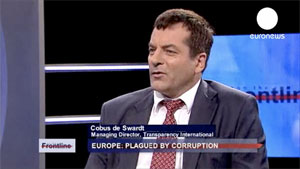Last Friday, Cobus de Swardt, Managing Director of the global Transparency International Secretariat in Berlin, was visiting Brussels for an interview in the Euronews show “On the Frontline” (OTFL) for a special edition titled “Is there a corruption crisis in Europe?” which aired yesterday.
The discussions around this show started already back in August when OTFL journalist Isabelle Kumar asked on Twitter:
Next On the Frontline: #corruption in EU. One more high level case- Austrian MEP guilty. Do you think corruption is endemic in Europe? #OTFL | @onthe_frontline
For us, the answer to this question was pretty clear: Our report “Money, Politics, Power: Corruption Risks in Europe” has set the tone for the answer. By kicking-off the interview with the statement that corruption in Europe is “worse than people often presume it is“, Cobus de Swardt had many issues ranging from non-transparent lobbying over weak political party financing rules to flawed public procurement rules across Europe in mind that we highlighted in the report.

Cobus de Swardt, Managing Director of Transparency International
The research results Cobus put forward also keep the EU Office of Transparency International in Brussels busy here at the European Union level. For instance with the ongoing reform of European public procurement rules or the recent proposal for the financing of European Political Parties and the regulation of election campaign finances for the 2014 European Parliament elections… and this is just to name a few.
After the interview, Cobus de Swardt joined us advocates from the Transparency International EU Office to discuss how to continue to link our global, European, and national campaigning in the most efficient way. For me, this was actually the first time I met with Cobus and I admit that while I think I have a global perspective in mind when fighting for more transparency and accountability at EU level, I realised through the discussion how challenging it is to organise a global civil society movement like ours.
The discussion with Cobus de Swardt and the special edition of “On the Frontline” on corruption were also a reminder that, while working here at the very special frontline we call the ‘Brussels bubble’ with its detailed and complex EU policy-making, there are quite many other frontlines out there in the fight against corruption all around Europe and beyond, and unless activists, media, citizens and policy-makers work together, this fight is hard to win.















 Connect with us on Facebook
Connect with us on Facebook Follow us on Twitter
Follow us on Twitter